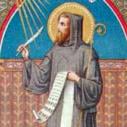Regina Caeli – Queen of Heaven, Rejoice!
The Regina Caeli, Latin for “Queen of Heaven,” is a hymn and prayer ...

Born at Ravenna, Italy, of poor parents, Peter Damian did farm work and tended swine in his youth. When his great intelligence was recognized, he was sent away to study at Faenza and Parma. In 1035 he entered the Benedictine hermitage of Fonte Avellana where he began to live a life of prayer and austerity. About the year 1043, Peter was chosen prior and spent the next several years establishing new monasteries and reforming old ones, becoming famous as an uncompromising preacher of holiness to clergy and laity alike. In 1057, Peter was made Cardinal Bishop of Ostia much against his will, adopting the name “Damian” in gratitude to his brother of that name, a priest who had financed his education. But after a brief period in his see, he obtained from the Pope permission to return to his life of solitude from which he sent several times on diplomatic missions as the Pope's legate. He died in 1072, on a journey back from one such mission to Ravenna, which he had reconciled to the pope. During his life, Peter Damian enjoyed great authority owing to his learning, zeal, and unquestionable integrity. He never tired of denouncing immorality and dishonesty when he found such among the clergy. Peter Damian’s Book of Gomorrah vehemently condemned the clerical sexual abuse and homosexual sin of many clergy, calling on the Pope to take severe and decisive action against offenders. The writings of St. Peter Damian treat of spiritual but also of doctrinal issues such as purgatory, the Eucharist, and the validity of sacraments administered by unworthy priests. Peter was never formerly canonized, but immediately revered as a saint following his death. In 1828 Pope Leo XII extended the liturgical feast of St. Peter Damian on February 21 to the universal Church and named him Doctor of the Church. Biography by Dr. Italy For more on what qualifies a person to be named a Doctor of the Church, see this Complete List of the Doctors of the Catholic Church.